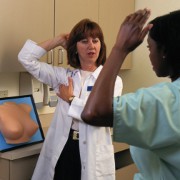 Photo: Getty Images
Photo: Getty Images
While women's health programs advise mammography screening to detect early stage breast cancer, far less focus is placed on the screening needs of breast cancer survivors or the risk of recurrences. A new study published in the Feb. 23, 2011 issue of the Journal of the American Medical Association indicated that mammography alone may not be adequate for those with a history of breast cancer. The authors, who believe this is the first comprehensive study of this issue, advise women to work with their oncologists to develop a personalized screening strategy as part of their survivorship program.
While annual mammograms help detect second breast cancers, the study showed they were more effective in women who have never had the disease. Survivors were more likely to have false positives - a cancer finding that turns out to be benign after further testing. This is because women's breasts change after surgery and radiation, leading to results that can appear abnormal to a radiologist but are not.
The study also found that breast cancer survivors were more likely to have what are known as "interval cancers" - those found between mammograms due to symptoms or additional testing. This finding indicates women need to continue monitoring their breast health after treatment and report changes and symptoms to their oncologist immediately instead of waiting for an annual screening date.
"The high prevalence of breast cancer survivors is due to general gains in life expectancy and to improved survival in women with a personal history of breast cancer (PHBC), attributable to improvements in local and systemic treatments and early detection," the authors write. Women with PHBC are at risk of developing second breast cancers and are recommended for annual screening mammography, but few high-quality data exist on screening accuracy in PHBC women, according to background information in the article.
The study was conducted by Nehmat Houssami, M.B.B.S., Ph.D., of the University of Sydney, Australia, with colleagues from the Breast Cancer Surveillance Consortium and Group Health Research Institute in Seattle, Wash.
They conducted the study to examine the accuracy and outcomes of screening mammography and factors associated with screening outcomes in women with a PHBC, who were matched to non-PHBC women and screened (1996-2007) through facilities affiliated with the Breast Cancer Surveillance Consortium.
There were 58,870 screening mammograms in 19,078 women with a history of early-stage (in situ or stage I-II invasive) breast cancer and 58,870 matched (breast density, age group, mammography year, and registry) screening mammograms in 55,315 non-PHBC women.
Women with PHBC had 655 second cancers (499 invasive, 156 ductal carcinoma in situ) and women without PHBC had 342 cancers (285 invasive, 57 ductal carcinoma in situ) within one year of screening mammography. Cancer rates were 10.5 per 1,000 screens in PHBC women, compared to 5.8 per 1,000 screens in non-PHBC women. Cancer rates, cancer detection rate, and interval cancer rate (number of false-negative results among 1,000 mammograms) were 1.3 to 2.6 times higher for PHBC screens compared with matched screens.
Screening sensitivity in PHBC was lower (65.4 percent) compared with that in non-PHBC screens (76.5 percent), due largely to lower sensitivity for detection of invasive cancer in PHBC (61.1 percent) relative to that in the matched group (75.7 percent).
Sensitivity of PHBC screens was similar for detection of ipsilateral (breast that was previously treated) and contralateral (breast not previously treated) cancer; and sensitivity for detection of second cancers was higher in women whose first cancer was ductal carcinoma in situ than in those whose first cancer was invasive. Sensitivity in the initial five years from first cancer was lower than sensitivity after five years. Screen-detected and interval cancers in women with and without PHBC were predominantly early stage.
"In general, screening did not perform as well in PHBC women relative to that in women without PHBC; sensitivity and specificity were lower for PHBC women, and screening examinations were approximately twice as likely to be recommended for additional imaging or biopsy," the authors wrote.
"Despite a relatively high interval cancer rate, interval cancers in PHBC women had generally favorable stage distributions. Our work also shows that screening outcomes and breast cancer rates in PHBC women are associated with various factors, including the treatment received for the first cancer, so these women have heterogeneous underlying risks for a second breast cancer, and a more tailored screening strategy than currently recommended might be warranted."
The researchers add that their findings support annual mammography screening recommendations in PHBC women but also highlight issues needing further evaluation, such as additional or alternate screening in specific groups of PHBC women who had very high rates of interval cancers including women younger than 50 years of age, women with extremely dense breasts, and those who received breast conservation without radiotherapy for their first cancer.
Resources:
Accuracy and Outcomes of Screening Mammography in Women With a Personal History of Early-Stage Breast Cancer
JAMA. 2011;305(8):790-799.
http://jama.ama-assn.org/content/305/8/790.full
Medscape: Mammography Less Accurate After Breast Cancer
http://www.medscape.com/viewarticle/737848
ABC News Video: Mammography in Breast Cancer Survivors
Dr. Christopher Flowers, Moffitt Cancer Center, explains the study.
http://abcnews.go.com/Health/video/mammogram-breast-cancer-survivors-12976075






Add a CommentComments
There are no comments yet. Be the first one and get the conversation started!